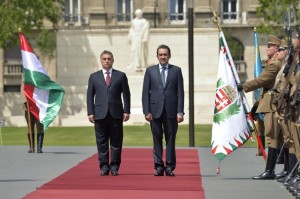 Kazakh Prime Minister Karim Massimov met with his Hungarian counterpart and other officials on June 3 in Budapest to discuss bilateral trade and economic cooperation.
Kazakh Prime Minister Karim Massimov met with his Hungarian counterpart and other officials on June 3 in Budapest to discuss bilateral trade and economic cooperation.
During Massimov’s talks with Hungarian Prime Minister Viktor Orban and Speaker of the Hungarian National Assembly Laszlo Kever, it was noted that Kazakhstan is Hungary’s largest trading partner among the Commonwealth of Independent States (CIS) and that Hungary supports Kazakhstan’s accession to the World Trade Organisation, which will create more opportunities for cooperation.
Relations between Kazakhstan and Hungary are based on close historical and cultural ties between their peoples, mutual understanding, a shared commitment to strengthening Eurasian and global security and stability, democracy and national progress, as well as human rights and freedoms.
“We need to bring Kazakh-Hungarian relations to a qualitatively new level of strategic partnership,” Massimov stated, adding that the prerequisites and legal frameworks to reach that level are in place.
Orban also expressed interest in cooperating with Kazakhstan across various industries.
Massimov’s meetings resulted in a number of documents, including a joint declaration on the strategic partnership between Kazakhstan and Hungary.
According to the declaration, key strategic areas of political and economic cooperation aretrade, cultural and humanitarian cooperation, oil and gas, agriculture, the development of non-oil sectors of the economy and the investment sphere. The two sides hope to cooperate at regional and global levels to ensure peace, stability and security.
The two sides noted existing bilateral cooperation in the field of energy and expressed a desire to increase that cooperation. They also noted that, in addition to fossil fuels, the two countries are focusing on developing cooperation in nuclear and renewable energy sources.
The two sides also noted they will encourage the participation of their business organisations in tourism events to be held in Hungary and Kazakhstan, cooperation between their organisations engaged in tourism and the sharing of experiences and best practices in tourism. The two countries also plan to develop governmental and nongovernmental relationships and will make a priority of encouraging cooperation between institutions of higher learning in each country. Such cooperation, they said, may have a positive long-term impact on the relations established in the fields of research and innovation.
As for cooperation in science and technological development, the two sides said they will expand cooperation in industrial innovations and legislation.
During the meeting with Kever, the sides discussed promoting trade and economic cooperation and inter-parliamentary cooperation. They stressed the need to strengthen political, economic and cultural ties between the two countries.
Massimov also invited Orban to pay a return visit to Kazakhstan, and the invitation was accepted with gratitude.
Within the framework of the visit, Massimov also took part in the opening ceremony of the Astana Street in the centre of Budapest and the memorial bust of Abai Kunanbayev.
The monument to the Kazakh poet was created and given as a gift to the municipality of Budapest by the East Kazakhstan region. A location for the monument was chosen on the walking-only Astana Street located in Varoshliget Park. Abai Kunanbayev is a symbol of Kazakh poetry. The author was able to pave new ways to develop the native language. Abai was also a composer and an expert of folk music. His works have been translated into 60 languages.
